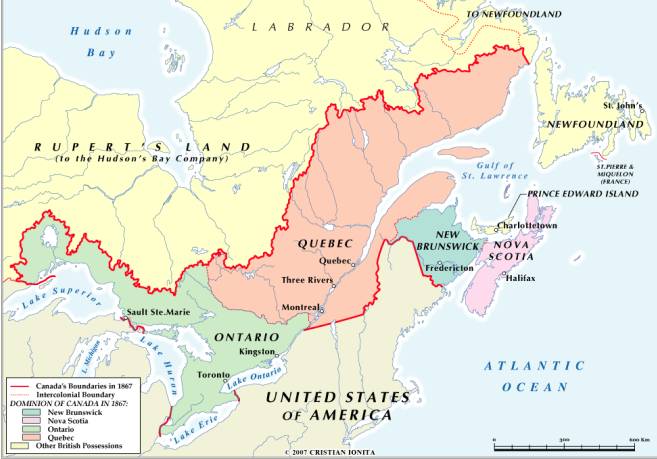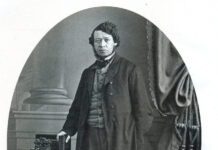It is said that the thought of being executed in the morning concentrates the mind wonderfully. The outbreak of the American Civil War in April, 1861 had a similar effect on the minds of the politicians of British America and London. The impact of the war on Confederation can hardly be exaggerated. It forced British America and the Imperial Government in London to take a more serious look at the old idea of uniting the British colonies in North America, and reinforced the British Government’s determination to end its defense commitments, especially in the Province of Canada.
British policy toward the United States and the rebellious Confederacy only made the situation worse for British America. Determined to remain neutral, and not get sucked into the conflict, Britain officially recognised the Southern Confederacy as belligerents, and was prepared to accept its envoys in London. The government of Abraham Lincoln found this attitude deeply offensive and widespread anger spread throughout the Northern states against Britain and its colonies to the north.
One Union naval officer took things a step further and almost started the war Britain had feared for so long. On November 8, 1861, Captain Charles Wilkes of the United States Navy was patrolling off the east coast, watching for Confederate shipping, when he stopped and boarded a British ship, the RMS Trent, carrying two Confederate envoys to Britain and France. He arrested both men and removed them from the Trent. This was immediately seen on all sides as a possible spark that could ignite war between the US and Britain, the kind of incident many had feared would arise from the Civil War.
Britain sent around 14,000 troops to reinforce the garrisons in Canada, the largest troop deployment in British America since the War of 1812. Some detachments sailed as far as the railhead at Riviere du Loup, but others were forced to march overland from New Brunswick to the railway, a long and difficult journey in mid-winter. Almost 7,000 soldiers made that 309-mile trip by sleigh before the Lincoln government finally agreed to release the two Confederate envoys and the danger of war passed. But the crisis had an effect on the future of Confederation that was pivotal.
British Americans had been faced with the very real possibility of war, one for which they were completely unprepared. They undertook a reorganisation of the militia and volunteer system, and recognised how vulnerable each colony was to American aggression. The need for a union of the British American colonies was obvious, at least while the crisis lasted. For Britain, the Trent affair brought about a change of policy regarding Confederation: as feared for so long, they had almost become embroiled in a war in North America and the weakness of their defenses there was made clear. There was no rail link between New Brunwick and Canada, forcing that long winter march along the Madawaska route.
Although the telegraph had worked well to connect the military in Halifax and St. John with those in Quebec, it was later discovered that all of their confidential communications had been received by the American authorities in Washington. As the telegraph technology was American, and the telegraph company was American, all of the telegraph operators were also American, and they had copied all the British communications to the American government. Later investigations concluded that Upper Canada, at least, was completely indefensible and could not be protected from American invasion.
The British Government concluded that, for their own protection, a union of their British American colonies was a desirable project, and from that time on they encouraged, promoted and even schemed to bring about the Confederation of the colonies. British Americans were aware of this attitude, and it became increasingly clear that their future choices lay between Confederation and annexation to the United States. They could hang together, or they hang separately. The Trent crisis made them realise, in stark terms, that they would rather remain British Americans, and not be absorbed into the neighbouring nation. The foundation of a distinctively Canadian identity was laid in 1861, when the future Canadian people decided their preferred destiny lay together, away from Britain’s apron-strings, and independent of the American Republic. After the Trent crisis of late-1861, the road to Confederation was open. But there were many obstacles and objections yet to overcome on the way.










Is that really all there is to it because that’d be flagebrgastinb.
More on the way.